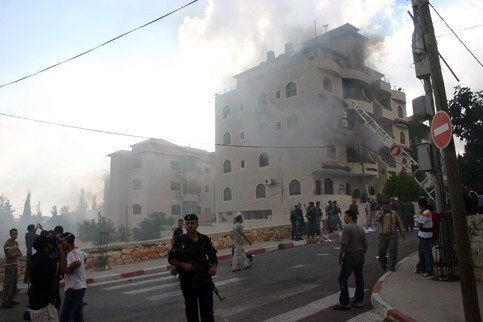3 October 2006

Palestinian police scuffle with hundreds of protestors from Fatah and the Al-Aqsa Brigades attacking the PLC building in the West Bank city of Ramallah after clashes between Hamas and Fatah supporters broke out across the Gaza Strip, 1 October 2006. (MaanImages/Fadi Arouri)
As non-governmental human rights organisations based in the Occupied Palestinian Territories (OPT), we are gravely concerned by the recent internal clashes between forces loyal to Fateh and forces loyal to Hamas. Six people were killed in Gaza on Sunday 2 October 2006, in the worst internal fighting for months, as striking government employees demanded the back payment of outstanding salaries. The following day gunmen forced businesses to shut their doors in several towns throughout the West Bank. The hardship created by Israel’s retention of tax revenues collected on behalf of the Palestinian National Authority (PNA) and the cessation of international aid has brought the OPT to the brink of a civil war.
It must be recognised that the current crisis stems from the almost 40-year-long Israeli occupation of the West Bank, including East Jerusalem, and the Gaza Strip, and the fact that both Israel and the international community have repeatedly failed to meet their obligations under international law with regard to the OPT.
Israel’s withholding of Palestinian tax revenues, amounting to 50-60 million USD per month, is a blatant violation of Israel’s duty as an Occupying Power to ensure the welfare of the civilian population in the OPT. The sanctions imposed on the Palestinian population represent a form of collective punishment, prohibited under Article 33 of the Fourth Geneva Convention, and constitute an attack on the exercise of the right to self-determination of the Palestinian people. Furthermore, the lack of funds has disrupted the supply of services essential to the safeguard of fundamental human rights such as the right to health and the right to education.
While continuing its oppressive occupation, Israel has refused to abide by international law. The international community has helped to perpetuate the occupation by alleviating some of Israel’s responsibilities toward the civilian population without seriously exerting pressure on Israel to end the occupation. This failed strategy of attempting to develop a nation under occupation has created an aid-reliant society, whose means of survival can be severed at any moment by the Occupying Power, as illustrated by the recent events.
Economic support given to the Palestinian population by the international community is greatly appreciated. However, a concerted effort must be made to uphold international law and bring the occupation to an end, without which there can be no solution to the conflict. The Quartet, and in particular the EU member states, have recognised the urgent need to alleviate the economic pressure imposed on the Palestinians, resulting in the creation of a temporary international mechanism to transfer funds for humanitarian purposes. This is a welcome measure, but one that falls very short of addressing deeper problems such as the fact that more than 150,000 civil servants have not received their full salaries since March 2006. On an even more fundamental level, Palestinians are being denied their basic rights under international law. The international community is actively participating in this.
In light of Israel’s disregard for its obligations as the Occupying Power and the risk of collapse of the Palestinian society, there is a vital need for third-party states to begin to uphold their international legal obligations. As Palestinian human rights organisations, we therefore urge:
Sincerely,
Al-Haq
Al Mezan Center for Human Rights
Addameer - Prisoners’ Support and Human Rights Association
The Palestinian Independent Commission for Citizen’s Rights
Defence for Children International - Palestine Section
Ramallah Center for Human Rights Studies
Women’s Centre for Legal Aid and Counselling
BADIL Resource Center for Palestinian Residency and Refugee Rights
Ensan Center for Democracy and Human Rights
Jerusalem Center for Legal Aid and Human Rights
Related Links